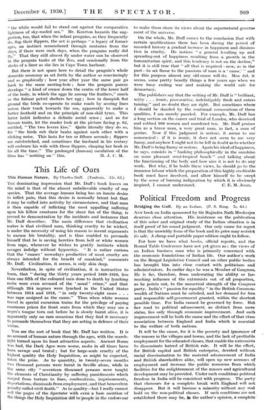This Life of Ours
This Human Nature. By Charles Duff. (Toulmin. Its. 6d.)
TILE dominating impression that Mr. Duff's book leaves on the mind is that of the almost unbelievable cruelty of our species. That the average human being has an innate desire to inflict pain, that this desire is normally latent but that it may be called into activity by circumstance, and that man is then capable of inflicting the most appalling suffering upon his fellow creatures for the sheer fun of the thing, is proved to demonstration by the incidents and instances that Mr. Duff describes. The main difference that civilization makes is that civilized man, thinking cruelty to be wicked, is under the necessity of using his reason to invent arguments to excuse his brutality, and is thus enabled to persuade himself that he is saving heretics from hell or white women from rape, whenever he wishes to gratify instincts which savages indulge without hypocrisy. It is rather curious that the ` causes ' nowadays productive of most cruelty are always intended for the benefit of mankind," comments Mr. Duff. Civilization, it seems, is only skin deep.
Nevertheless, in spite of civilization, it is instructive to learn, that " during the thirty years period 1889-1918, less than one fifth of the coloured men done to death by lynching mobs were even accused of the usual ' crime," and that although 264 negroes were lynched in the United States between 1914 and 1918, ." in only twenty-eight cases . . . was rape . assigned as the cause." Thus when white women travel in special excursion trains for the privilege of paying enormous prices .for front seats from which they may see a negro's tongue torn out before he is slowly burnt alive, it is apparently only on rare occasions that they find it necessary to persuade themselves that they are acting in defence of their virtue.
You see the sort of book that Mr. Duff has written. It is an account of human nature through the ages, with the search- light tinned upon its least attractive aspects. Ancient Rome was bad, the Dark Ages were worse, mobs in all times have been savage- and brutal ; but for large-scale cruelty of the highest quidity the Holy Inquisition, as might be expected, takes the prize. As to- quantity, iri twenty-seven months two thousand persons were burnt in Seville alone, while in the same city "seventeen thousand peisons -were taught the elements Of Christianity by suffering punishments - which ranged -from torture to fines, • confiscations, 'imprisonments, deportations; dismissals from-employment, and that benovelent penalty called eisril death." As to quality—but I really cannot soil the pages of the ;Spectator with even-a Bare mention of the things the Holy EIrmOisition did to'peeple in-the endeavour
to make them share its views about the supernatural governs ment of the universe.
On the whole, Mr. Duff comes to the conclusion that with certain qualifications there has been during the period of recorded history a gradual increase in happiness and diminu. tion in cruelty. Ile notices a general levelling up and spreading-out of happiness resulting from a growth in the humanitarian spirit, and this tendency is not on the decline," but it is still true that " all that is required—now, as in the past—to set flame to the passions of man is a ' cause,' " and for this purpose almost any old cause will do. Men did, it seems, some pretty beastly things a few years ago when we were busy ending war and making the world safe for democracy.
The publishers say that the writing of Mr. Duff is " brilliant, witty . . . ironic, provocative, indefatigably fresh and enter. taming," and no doubt they are right. But sometimes where I should be dazzled by the continual coruscations of these qualities, I am merely puzzled. For example, Mr. Duff has a long section on the career and trial of Landru, who deceived and robbed 169 women and murdered ten. Mr. Duff praises him as a brave man, a very great man, in fact, a man of genius. Now if this judgment is serious, it seems to me nonsensical ; if it is ironic, it does not seem to me very funny, and anyhow I ought not to be left in doubt as to whether Mr. Duff is being-fanny or serious. Again his ideal of happiness, he says, consists in " basking philosophically in the sunshine on some pleasant semi-tropical beach" and talking about the functioning of the body and how nice it is not to do any work. But why, if he holds these views, he should go to the immense labour which the preparation of this highly creditable book must have involved, and allow himself to be swept by the sense of burning indignation by which it is obviously inspired, I cannot understand. C. E. M. Joan.


























































 Previous page
Previous page